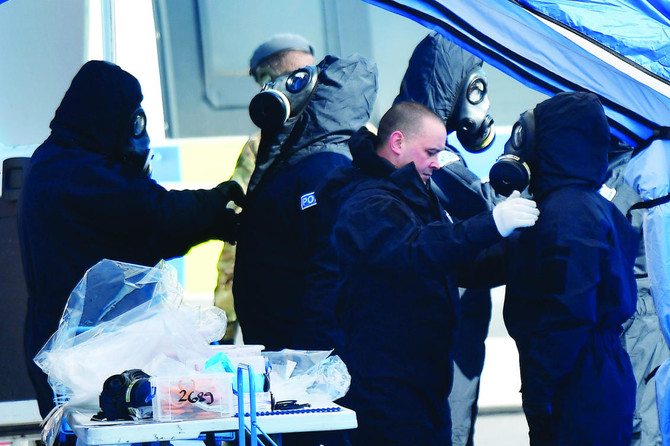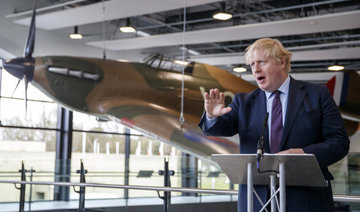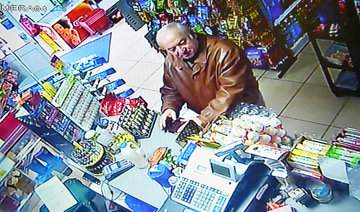BRUSSEL: Britain’s foreign minister said on Monday that Russian denials of responsibility over a nerve agent attack on a former Russian double agent in England were “increasingly absurd.”
Boris Johnson, who briefed fellow European Union ministers in Brussels on Monday, also won renewed support from the bloc, though diplomats cautioned there was no immediate prospect of fresh economic sanctions on Russia.
“The Russian denial is increasingly absurd,” Johnson told reporters as he arrived for the regular monthly meeting, which came a day after Vladimir Putin was re-elected for another six-year term as Russia’s president.
“This is a classic Russian strategy ... They’re not fooling anybody anymore,” Johnson said.
“There is scarcely a country around the table here in Brussels that has not been affected in recent years by some kind of malign or disruptive Russian behavior.”
Russia denies any involvement in the attempted murder of Sergei Skripal and his daughter Yulia, in what was the first known offensive use of nerve gas in Europe since World War Two.
Moscow on Saturday announced the expulsion of 23 British diplomats in a tit-for-tat response to Britain’s decision last week to expel the same number of Russian diplomats from London.
On Sunday, Johnson accused Russia of stockpiling the deadly Soviet-era nerve agent Novichok used to poison the Skripals, a charge Moscow denies. They were found unconscious on a bench in the English city of Salisbury on March 4 and remain in a critical condition in hospital.
On arrival at the Brussels meeting on Monday, Germany’s new foreign minister, Heiko Maas, expressed his support for Britain. Later, all 28 EU foreign ministers issued a joint statement on the attack, expressing “unqualified solidarity.”
“The European Union takes extremely seriously the UK government’s assessment that it is highly likely that the Russian Federation is responsible,” the statement said.
Swedish Foreign Minister Margot Wallstrom rejected an allegation by the Russian Foreign Ministry that the nerve agent used in Salisbury might have come from Sweden.
“This is just ridiculous and totally unfounded,” Wallstrom said. “I think they are trying to divert the real issues here.”
While there is no prospect of further sanctions on Russia being agreed on Monday, British Prime Minister Theresa May will have an opportunity to present her case for any such measures at an EU summit on Thursday, or call for others to expel diplomats.
“We need to put pressure on Russia to take part in a real enquiry about the attack,” Belgian Foreign Minister Didier Reynders told reporters.


Denials of British attack ‘increasingly absurd’ — Johnson
Denials of British attack ‘increasingly absurd’ — Johnson

Displaced Cambodians in limbo as nationalist victory in Thailand adds to pressure
PREAH VIHEAR: Six weeks after a ceasefire ended fighting at the Thai-Cambodian border, thousands of displaced Cambodians still hope to return home, despite an election victory in Thailand by nationalists who want to wall off the disputed frontier.
In Banteay Meanchey province, Proeung Sopheap, 59, was visiting her abandoned home in the border village of Prey Chan for the first time since the December clashes to collect some personal belongings and cooking utensils.
“I don’t know what led to this fighting,” she said. “Like other Cambodians, I want peace, not war.”
In an election last week, Thailand’s Prime Minister Anutin Charnvirakul romped to victory on a platform that includes building a wall at the border.
During a visit to the area on the Cambodian side, most of the people Reuters spoke to said they knew nothing about last week’s Thai vote or what the implications might be for the area.
Pich Vorn, displaced from the neighboring village of Chouk Chey, said he just wanted his house and land back.
“Even if it is small, it is where I have lived for many years.”
The worst fighting in more than a decade has left Sopheap’s village Prey Chan divided: Thai authorities say part of it is in Thailand, and have put up barbed wire fencing, now reinforced with a barrier formed of metal shipping containers.
On the Thai side, authorities say all residents have been able to return home since fighting ended.
But on the Cambodian side, officials estimate that about 80 percent of land and homes in Prey Chan and Chouk Chey communes are now inaccessible, leaving more than 4,600 people living in temporary shelters.
Thailand said in a statement on Friday the installation of barriers “to enhance safety and security along the border” was “fully consistent” with the joint statement agreed by the two countries during the ceasefire on December 27.
The border clashes killed at least 149 people and displaced hundreds of thousands along the 817-kilometer border (508-mile) before Thailand and Cambodia agreed to a second ceasefire in late December, after an earlier truce from July collapsed.
Both sides have traded accusations of aggression. They have tussled over their shared border for decades.
FIGHTING SCARS THOUSAND-YEAR-OLD TEMPLE
At the Preah Vihear Temple, an 11th-century UNESCO World Heritage site at the border, Cambodian authorities say bullet holes, dents and unexploded ordnance scattered across the complex were the result of Thai artillery during border clashes.
The Thai foreign ministry did not comment on this issue when asked by Reuters.
“It is truly regrettable to see a World Heritage site fired at and destroyed like this,” Pheng Sam Oeun, deputy director general of National Authority for Preah Vihear temple said.
Cambodia has submitted damage reports to UNESCO and implemented emergency measures to stabilize the most severely affected sections of the temple. Sam Oeun said funding for full restoration remains uncertain.
The Cambodian Mine Action Center is clearing cluster munitions and unexploded artillery shells around the grounds.
Mines and unexploded ordnance remain a menace on both sides of the frontier. Demining manager Ean Sothea said Cambodian authorities had shut more than 40 schools across Preah Vihear province and prioritized clearance at hospitals, pagodas and homes of returning residents.
On the Thai side, a soldier lost a limb on Wednesday after stepping on a land mine at a border area in Kantharalak district of Sisaket province, the Thai army said.
Landmine blasts along disputed frontier areas were among the catalysts behind the border clashes last year, with at least 12 Thai soldiers severely injured since last July.
In Banteay Meanchey province, Proeung Sopheap, 59, was visiting her abandoned home in the border village of Prey Chan for the first time since the December clashes to collect some personal belongings and cooking utensils.
“I don’t know what led to this fighting,” she said. “Like other Cambodians, I want peace, not war.”
In an election last week, Thailand’s Prime Minister Anutin Charnvirakul romped to victory on a platform that includes building a wall at the border.
During a visit to the area on the Cambodian side, most of the people Reuters spoke to said they knew nothing about last week’s Thai vote or what the implications might be for the area.
Pich Vorn, displaced from the neighboring village of Chouk Chey, said he just wanted his house and land back.
“Even if it is small, it is where I have lived for many years.”
The worst fighting in more than a decade has left Sopheap’s village Prey Chan divided: Thai authorities say part of it is in Thailand, and have put up barbed wire fencing, now reinforced with a barrier formed of metal shipping containers.
On the Thai side, authorities say all residents have been able to return home since fighting ended.
But on the Cambodian side, officials estimate that about 80 percent of land and homes in Prey Chan and Chouk Chey communes are now inaccessible, leaving more than 4,600 people living in temporary shelters.
Thailand said in a statement on Friday the installation of barriers “to enhance safety and security along the border” was “fully consistent” with the joint statement agreed by the two countries during the ceasefire on December 27.
The border clashes killed at least 149 people and displaced hundreds of thousands along the 817-kilometer border (508-mile) before Thailand and Cambodia agreed to a second ceasefire in late December, after an earlier truce from July collapsed.
Both sides have traded accusations of aggression. They have tussled over their shared border for decades.
FIGHTING SCARS THOUSAND-YEAR-OLD TEMPLE
At the Preah Vihear Temple, an 11th-century UNESCO World Heritage site at the border, Cambodian authorities say bullet holes, dents and unexploded ordnance scattered across the complex were the result of Thai artillery during border clashes.
The Thai foreign ministry did not comment on this issue when asked by Reuters.
“It is truly regrettable to see a World Heritage site fired at and destroyed like this,” Pheng Sam Oeun, deputy director general of National Authority for Preah Vihear temple said.
Cambodia has submitted damage reports to UNESCO and implemented emergency measures to stabilize the most severely affected sections of the temple. Sam Oeun said funding for full restoration remains uncertain.
The Cambodian Mine Action Center is clearing cluster munitions and unexploded artillery shells around the grounds.
Mines and unexploded ordnance remain a menace on both sides of the frontier. Demining manager Ean Sothea said Cambodian authorities had shut more than 40 schools across Preah Vihear province and prioritized clearance at hospitals, pagodas and homes of returning residents.
On the Thai side, a soldier lost a limb on Wednesday after stepping on a land mine at a border area in Kantharalak district of Sisaket province, the Thai army said.
Landmine blasts along disputed frontier areas were among the catalysts behind the border clashes last year, with at least 12 Thai soldiers severely injured since last July.
© 2026 SAUDI RESEARCH & PUBLISHING COMPANY, All Rights Reserved And subject to Terms of Use Agreement.












